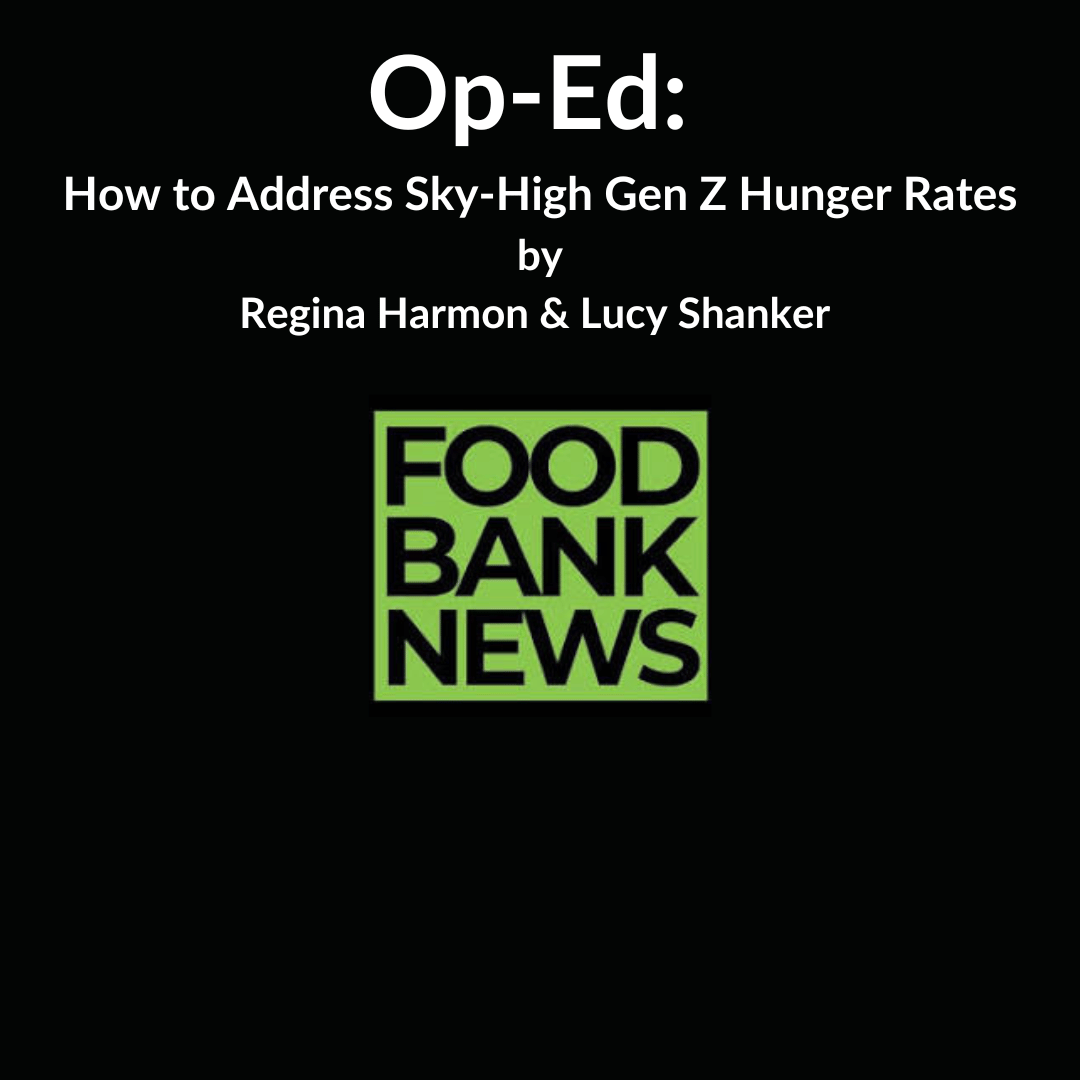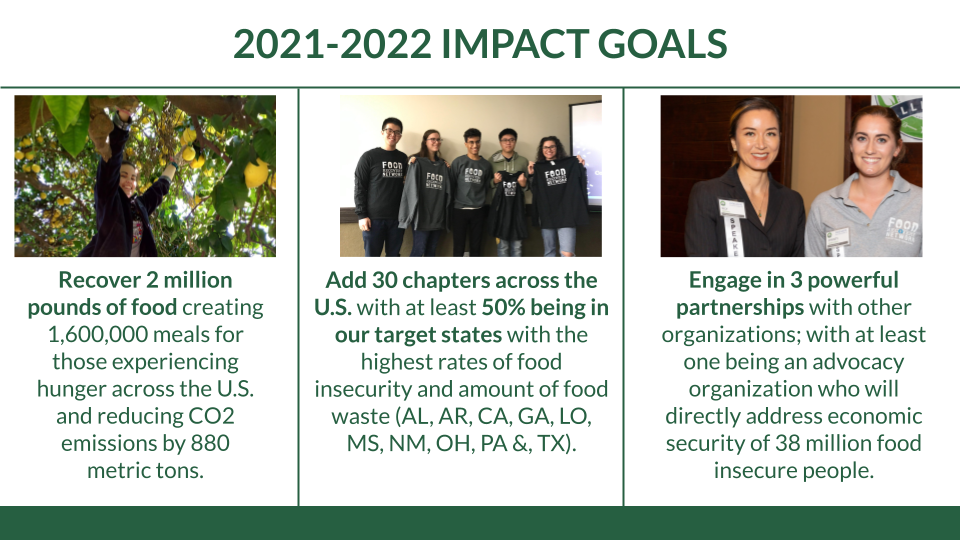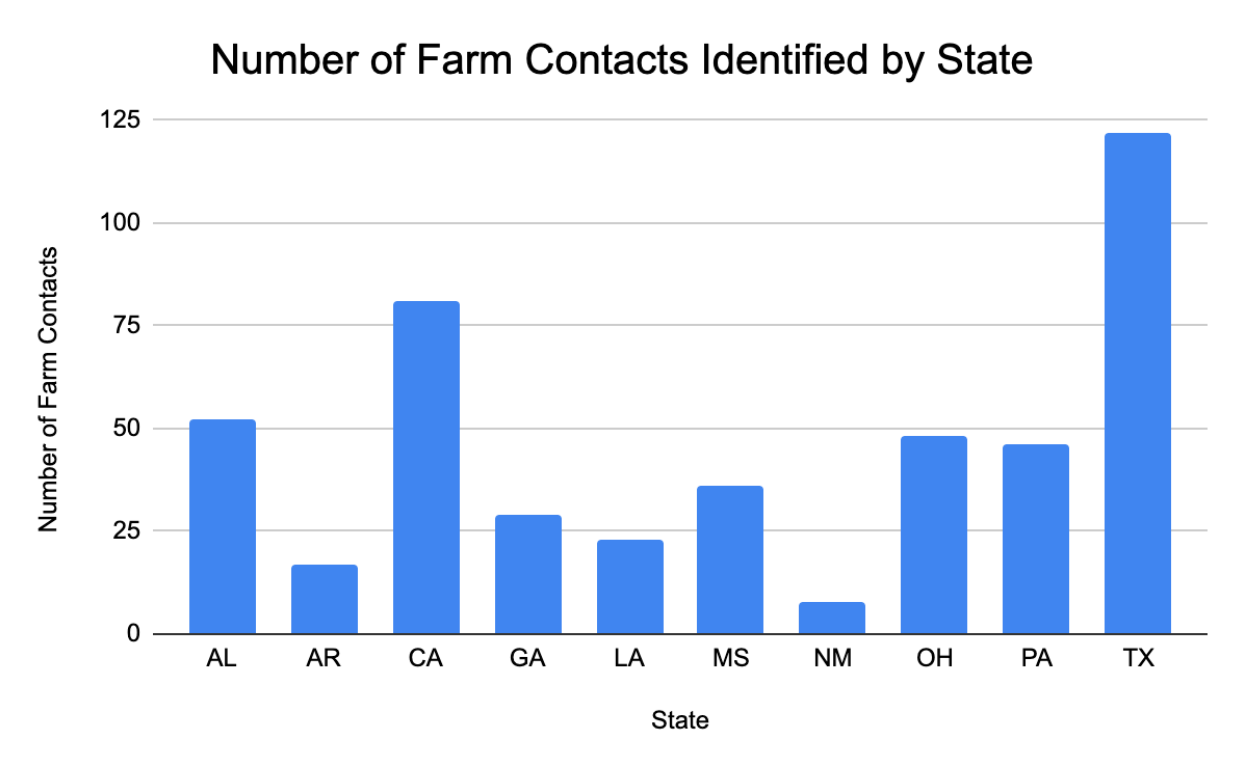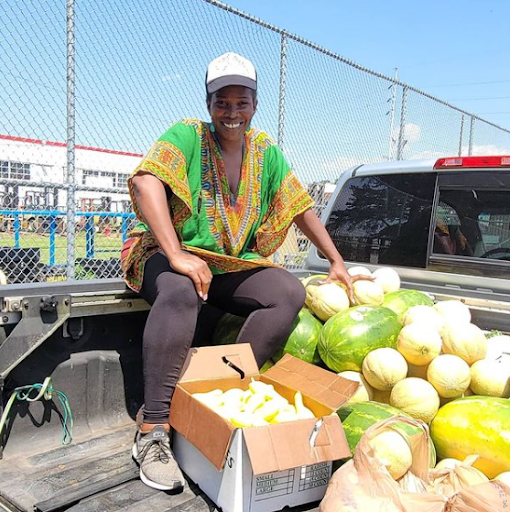Achieving goals is not just a series of successes one right after the other. Between each success is hard work, pivoting, failure, recalculations, and tenacity in motion. Now that Food Recovery Network is solidly in the rhythm of our strategic framework, FRN10X, our biannual Roundtable Talks are much more saturated with examples of applied learning, analysis, and very specific requests to the entire network needed to accomplish the work ahead.
During these Talks, we share the incredible milestones and goals we’ve achieved, of which there are several. Importantly, the Roundtable Talks also provide the space where we share the hardships between those successes that come along with changing the narrative from food waste to food recovery. Our hope is that by sharing those details, we can continue to work with all of you to achieve our goals for this program year and feed people experiencing food insecurity, faster.
In late August 2022, FRN hosted our most recent bi-annual Roundtable Talk. The Talk provided an update on our progress in achieving our stated metric goals for the 2021-2022 program year and reflected on our learnings over that same period of time. We also outlined what we aim to accomplish during the 2022-2023 program by unveiling a new set of ambitious metrics. We hope you can listen to the Talk as it provides so much texture to how we accomplished our many goals, and surpassed every single ambitious metric we set out to achieve. We ask that you share the conversation with your colleagues, friends and family members because it will take all of us to achieve the “near impossible” goal to end hunger forever. Near impossible, but absolutely achievable, together.
Let’s dig in.
Abundance, Accomplishments, and Appreciations
Throughout the conversation the word abundance was referenced often. Abundance in gratitude for the student leaders, for dining providers, for nonprofit partner agencies; for an abundance of food that we were able to recover. FRN works to feed people today by recovering food at the commercial and institutional setting. Each year, combined in those settings, more than 26 million tons of food is wasted, and we know FRN has a unique contribution to lower that astronomical amount of food waste. We worked to grow the number of FRN chapters across the US, including in the 10 states we identified that have the highest rates of food insecure individuals and the highest rates of surplus food. We also deepened our partnerships with organizations aligned in our work.
Goals FRN set out to achieve during the 2021-2022 program year in our August 2021 Roundtable Talk
And here is what we achieved: we surpassed all of our goals for the 2021-2022 year
Throughout the conversation we gave thanks to the hard-working student leaders who tirelessly conduct food recoveries, recruit fellow students to help out, and who organize and participate in advocacy and educational events. We know that 85% of our chapters are facing challenges related to COVID. Still. And yet, when we look at our numbers, despite the challenges they face, our student leaders are showing up to help feed their neighbors in need, to help their fellow students in need. While the amount of food recovered by our FRN chapters is still lower than pre-pandemic semesterly averages, our chapters have recovered more than 102,917 pounds of surplus food compared to the previous academic year, a 38% increase. There goes my heroes, off to class, off to practice, headed to church, to the gym. Thank you all so much.
What we learned: Investments of all kinds matter
The Roundtable Talk offered insights into what we learned over the course of the previous program year. Despite the hardships, FRN surpassed all of our ambitious goals.
And I want to give space to the hardships for just a moment as we did during the Talk. This past year was hard. There were continued stressors, and those stressors do not seem to be letting up: inflation, continued COVID disruptions, confusion around the monkeypox virus, gun violence on top of the life stressors students take on just by being on the journey to obtain higher education. Throughout those hardships, together, we achieved. We give so much kudos to our student leaders and everyone in the FRN network.
What was it that enabled FRN to achieve our metrics despite the hardships? I spoke at length about investments. What do I mean by investments? I mean both the material (money) and the intangible (cultural).
FRN pays every single person on our team a living wage. Materially, people deserve to be paid fairly for their work and in doing so, our team was able to show up and achieve. FRN pays the farmers we work with to harvest and transport their surplus food, and often, as you can read about in our Atlanta pilots, we also pay them for the actual produce. We pay student leaders for their talents when they commit to specific project work with FRN outside of their dedicated volunteer chapter work. FRN supports the economic security of our team. We respect our network and that respect means paying people fairly.
We invest in our communities. Our Atlanta Georgia gleaning pilots continue to be an incredible learning resource for FRN on how to listen to the needs of the community in which you are working with the purpose of helping. The community members know where the surplus food needs to go, and they know what resources they need to move more food faster to feed more people. That’s why we’re starting a 6-week after-school pop-up farmers market at K-12 schools in Atlanta, focusing on areas with disproportionate rates of hunger. And we’ve already put more than $16,000 back into the Atlanta community.
We’re investing in our data-driven approach to feeding more people, faster. We understand that our metrics of pounds of food recovered, meals donated, CO2 emissions diverted, and chapter growth tell an important story, and it’s not the whole story. We will work this year to include new metrics, such as continuing to track how much money we are able to put back into the communities we are supporting, and how many volunteer hours we are able to harness to achieve the goals of our communities.
We will continue to invest in our incredible student leaders. We are delighted to get back out into the field to meet up with our leaders and support them live-time. Our students need grants to purchase supplies, and we will continue to offer programming based on their needs.
From our deepening relationships with Poor People’s Campaign to Fight for $15, WeightWatchers to support the passage of the Food Donation Improvement Act, our FRNds in Atlanta and Irvine to support our gleaning pilots, we crystalized our belief that when we work with values-aligned organizations, we are able to increase our impact to end hunger forever.
We consider you a partner in this work. And the relationship FRN has with you is of utmost importance. Your activities, attending the Roundtable Talks, reading our blog and newsletter, making financial contributions, checking to see if specific schools have a chapter, and making introductions when you find out they do not are part of the cultural shift to normalize food recovery.
Thank you for all that you do. I am so excited to continue to highlight our partnerships in this upcoming program year, and be in touch.
Your invitation to be involved: 2022-2023 Impact Goals
Together, this year we can achieve these 2022-2023 metric goals. Be in touch with us with your ideas, with your connections, and if you’re not sure how you can help, reach out and we will share ideas with you! We have plenty of ways for you to support the work in ways that make sense for you.
In solidarity,
Regina






















